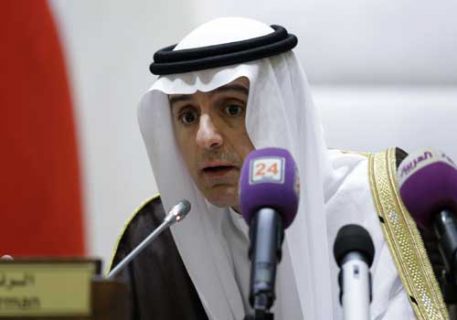Undiplomatic Diplomacy
YemenExtra
Saudi Arabia continues to needlessly make more enemies for itself
By: Abdel Bari Atwan
Saudi diplomacy under the current foreign minister, Adel al-Jubeir, has been distinctly lacking in the qualities and practices normally described as ‘diplomatic’: such as the use of verbal restraint to suppress quarrels, defuse tensions and improve a country’s relations with other states and organizations.
Rather than recounting countless examples, we can refer to two recent incidents which earned the Kingdom unprecedented anger from two former partners one European and the other Arab which it could well do without, especially these days.
First, Jubeir launched a diatribe against Palestine’s Hamas movement, which he lambasted as ‘extremist’. This prompted it to reply with an angry statement that the minister did not reflect the views of the Saudi people or their historic commitment to the Palestinian cause and that his remarks would only serve to encourage the Israeli enemy to commit more crimes.
Then came the insulting response by Jubeir and other Saudi officials to Germany’s decision to cease supplying arms to any of the parties involved in the conflict in Yemen, where thousands of people have been killed, millions have been impoverished and the infrastructure has been devastated as a result of the Saudi-led war on and blockade of the country.
The Saudi foreign minister replied by publicly telling the Germans ‘we don’t need your weapons’, while Anwar al-Ishqi, front-man for Saudi Arabia’s flirtation with Israel, went on German TV to say that Saudi Arabia had only purchased arms from Germany to support its economy, and that American-made weapons were of better quality.
It is hard to explain Jubeir’s verbal assault on Hamas as anything other than an attempt to bring Saudi Arabia into line with the policy of Israel and the US and their attempt to demonize all and any resistance to the Israeli occupation. Saudi Arabia had already included Hamas on its terrorist list alongside groups such as al-Qaida and Islamic State, and its diplomats and officials have increasingly taken to reviling it in public statements.
As a professed strategic analyst, Ishqi could have taken the trouble to find out something about Germany’s budget and the sources of its national income, including figures showing that in the first three quarters of 2017 its military sales to Saudi Arabia amounted to a mere 148 million euros. How can this — or even ten times that amount — be deemed to amount to Saudi ‘support’ for Europe’s economic powerhouse and the world’s fourth largest economy?
Hamas is neither ‘extremist’ nor ‘terrorist’, but a movement that engages in legitimate resistance to an illegal, vicious and racist occupation. It has never carried out any attacks against Israeli targets outside occupied territory.
Jubeir’s statements constitute a break with decades-old constants of Saudi foreign policy. Although he is presumably a functionary rather than a decision-maker, those who actually make the decisions need to radically reconsider them before it is too late. Unless they think that this kind of behaviour is just what the Kingdom needs these days, in which case there is no point talking – let’s just await the dire consequences.

